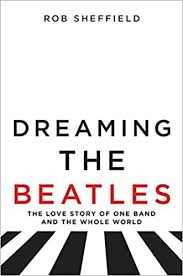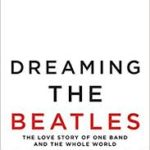When you find a successful formula, you stick with it.
Rolling Stone contributing editor Rob Sheffield follows this truism with his terrific – or should I say Fab? – new book Dreaming the Beatles.
Much like his outstanding 2016 tome, On Bowie, which the author described as “a love letter,” Dreaming the Beatles also brings the amore and is subtitled “The Love Story of One Band and the Whole World.” And as he did with On Bowie, Sheffield relies heavily on his own visceral response to the music to craft Dreaming the Beatles.
This isn’t a biography; nor is it a memoir. But it has elements of both, as Sheffield recounts how Beatles music made him feel growing up – and as a grownup – while also devoting chapters to the individual Beatles and individual albums and songs.
One minute, you’re reading about Sheffield’s long relationship with “Yes It Is;” the next, you’re in the studio during the “White Album” sessions and learning how an extremely stoned John Lennon came up with the tempo for Paul McCartney’s “Ob-La-Di, Ob-La-Da,” a song Lennon and the rest of the Beatles detested. He also looks at American Beatles oddities such as the compilation albums Beatles IV, Rock and Roll Music and Love Songs and B-sides and lesser-known material such as “You Know My Name (Look up the Number)” and “It’s All Too Much.”
It’s a compelling read, equal parts recollection and research, although folks who aren’t physically impacted by music might miss the import of what Sheffield has to say. You either get it or you don’t.
At 368 pages, Dreaming the Beatles carries a bit too much weight, and chapters on songs about the Beatles and the age-old – and pointless – Beatles-vs.-Stones debate could have easily been excised without lessening the book’s cred. But when Sheffield hilariously debates the merits of George Harrison’s “Something” (“the one that made John and Paul most jealous”) against McCartney’s “My Love” (“the worst song any of the Beatles had anything to do with”), the results are worth reading twice.
Sheffield looks beyond early 1970 and spends ample time discussing the musicians’ post-Beatles life, painting Ringo Starr as the most affable Beatle, and taking long looks at solo successes and failures, the latter summed up by Harrison’s disastrous 1974 U.S. tour and a coked-out, much-bootlegged (as “A Toot and a Snore in ‘74”) studio session between Lennon, McCartney, Stevie Wonder, Harry Nilsson, Bobby Keys and others. (Starr and Keith Moon had just left, robbing an already-debauched encounter of even more debauchery).
Lennon’s 1980 murder, Starr’s unflagging good-naturedness, Harrison’s love troubles and religiosity and McCartney’s long and varied career – right up to a 2016 concert – are all dealt with, some more in-depth than others. But at its core, “Dreaming the Beatles” is about the band’s staying power and how the band’s absence – felt so strongly in the 1970s – has morphed into the band’s undying presence. At the book’s writing, the hits collection 1, released in 2000, is the best-selling album of the 21st century; and the Beatles still sell about 1 million records annually, besting Led Zeppelin, Pink Floyd and Fleetwood Mac.
That an amazing accomplishment for a band that broke up 47 years ago, stopped playing concerts years before the bust up and is quite literally half dead. Sheffield spends the book explaining why that’s the case and – perhaps more importantly – why it’s entirely justifiable.
Keeping it simple, Sheffield sports an engaging writing style that makes for easy and leisurely reading. Here’s the opening paragraph:
“The Beatles: John played guitar. Paul played bass. George played lead guitar, and Ringo drummed. They all sang. John and Paul wrote the songs; soon George wrote, too. Ringo wrote a couple. Formed in Liverpool, late 1950s; broke up in London, 1970.”
It’s obvious Sheffield, like most people, loves the Beatles. But he’s no all-loving fanboy. And he’s not shy about offering criticism – sometimes scathing – where criticism is due. The result is an engrossing love story that is also informative enough to ensure that even the most ardent Beatlemaniacs will come away knowing more about the band than they did when they first picked up the book.




No Comments comments associated with this post